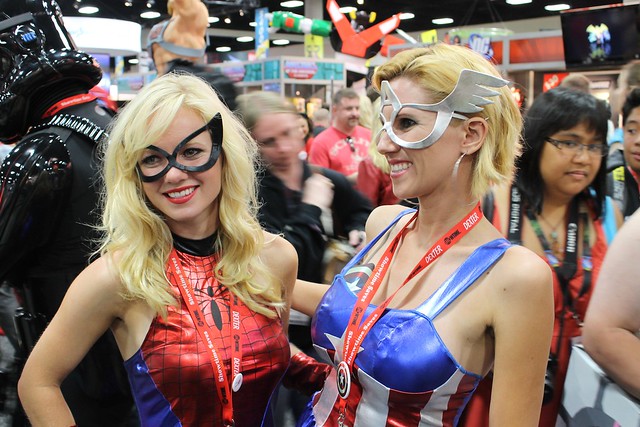
Douglas Wolk me conquistou há uns anos, quando li seu
Reading Comics. Encontrei ali um poço de sensatez sobre histórias em quadrinhos. Não é sempre que isso acontece. Num mundo dominado por fãs, trabalho e paixão se confundem com muita facilidade. As coisas se misturam demais - editores viram jornalistas, jornalistas viram criadores, criadores viram donos de lojas e por aí vai. É uma promiscuidade que, verdade seja dita, faz parte desse universo - e que, no fim das contas, traz mais benefícios que prejuízos. Mas que, de qualquer forma, acaba minando a objetividade. (Eu estava falando do mercado americano, mas, ao reler, me dei conta de que a descrição se encaixa direitinho pro Brasil.)

Mas Wolk era sensato. Tinha opiniões decentes. Não se deixava impressionar pelo sucesso de mercado. Tinha um bom gosto invejável pra selecionar bons quadrinhos (não me arrependi de nenhuma das dicas que peguei dele). Suas críticas não só comentavam a HQ mas, como deveria ser sempre, iluminavam a leitura.
Comic-Con strikes again! é seu novo livro. Um livrinho, na verdade, mais precisamente um
Kindle Single, que é o formato de publicações rápidas para leitura digital, e que só estão à venda na Amazon mesmo.
O que Wolk faz é levar o leitor a um passeio pela San Diego Comic-Con. Eu nunca fui e, sinceramente, não tenho vontade de ir a passeio, como alguns amigos eventualmente sugerem. A trabalho, como todo mundo que eu conheço vai, seriam outros quinhentos. Mas como turismo me parece mais roubada que a 25 de Março em véspera de Natal. Wolk confirma minha intuição: descreve os horrores das filas, os cosplayers mais medonhos, os fanatismos que certamente me deixariam irritado. Mas também fala de novidades - mesmo pra quem, como eu, leio sobre a Comic-Con hpa anos. Foi pelo livro que fiquei sabendo de várias sutilezas que, provavelmente, nem estando lá eu veria, como a mesa dos primeiros colecionadores de gibis (algo que me lembrou dos leitores brasileiros de Tex).
Tenho a impressão de que o livrinho rápido e barato vai encantar tanto os leitores de quadrinhos quanto os espectadores de cinema, já que os dois acompanham cada vez mais de perto a Comic-Con. Também me parece que será uma leitura proveitosa pros jornalistas que cobrem entretenimento, porque dá uma ideia geral de um evento cada vez mais importante.
Dito tudo isso, chegamos ao que importa no post: os trechos de Comic-Con strikes again que separei pra compartilhar aqui:
"Comic-Con is a bacchanalian 100-hour orgy of
fandom, and fandom is all about cathexis: investing one’s energy and
identity in a particular idea or person or thing. The genius of the pop
culture of the past century is that it’s turned extendable brands into
the objects of cathexis. A piece of popular entertainment is almost
never only itself: if you find yourself attracted to it, it leads you to
invest yourself into it with the promise that there’s more where that
comes from."
"There are lines to get into the building, lines
to get into panels and screenings, lines to buy 'limited-edition
collectibles,' lines to get autographs, lines to get tickets to get
autographs, lines to get food, lines to get across the street. There are
lines to buy tickets for next year’s show. The first line you encounter
is the very long one at the end of which you hand over your ticket. In
return, they give you four things: a badge that gets you into the
convention center; a 192-page catalogue of events, with a bound-in
section of maps; a magazine with articles about a handful of show guests
and media anniversaries; and the biggest goddamned shopping bag you
have ever seen in your life, with a strap to convert it into a backpack
so as to better display its billboard-sized ad for some movie or game or
show."
"If you’re making the kind of media that people wear T-shirts about, you need fans, and you need the biggest fans first."
"These are the people who seek out their favorite
artifacts of culture, and glom onto them, and live the life: reading,
discussing, watching, rereading, thinking, decorating, dressing,
collecting, rewatching, quoting, accessorizing. They post on message
boards. They tweet. They tell their friends what they like. The fact
that it’s now harder than ever to buy tickets to the show and get a
flight to San Diego and arrange for a place to stay just means that the
people who pull it off are the most committed of all, and the most
valuable tastemakers."
"These days, turning a comic book into a
movie isn't enough; that happens all the time. The buzzword of Comic-Con
2011, the thing everybody in the business is talking about, is 'transmedia'."
"Star Wars is our holy writ. Star Trek,
oddly, has become camp now--the sort of thing that old-school fans used
to like--especially thanks to William Shatner’s slow slide into cheerful
self-parody. But Star Wars holds us together."
"Every entertainment professional I know dreads Comic-Con at least a little bit, and most of them go anyway."






